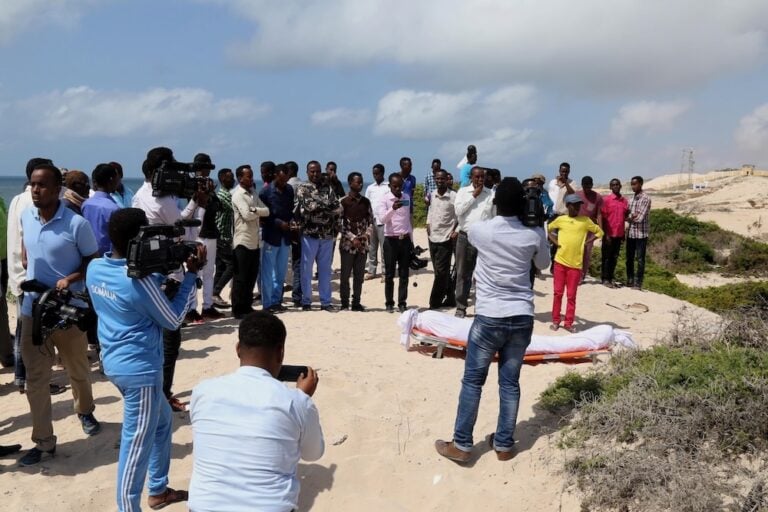Some journalists have been receiving death threats following the airing of an off-the-record discussions between the press and a military commander.
(NUSOJ/IFEX) – 28 January 2012 – The National Union of Somali Journalists (NUSOJ) is deeply concerned over the danger journalists in Mogadishu have been exposed to through the activities of UN-funded Radio Bar Kulan (RBK). Unbeknownst to the journalists present, the station aired live discussions between them and the Force Commander (FC) of African Union peacekeeping troops in Mogadishu (AMISOM).
NUSOJ has received incontrovertible reports from journalists of death threats they received after the incident, which took place on 29 November 2011.
At least eight journalists now fear for their lives after getting death threats from members of Al Shabaab. Some 22 journalists and cameramen attended the discussions with the AMISOM Force Commander, which concerned the militant group and its strategies. Unbeknownst to them, the voices of the journalists who spoke to the commander were recorded by Al-Shabaab’s propaganda machinery, Radio Andalus.
Al-Shabaab officials later telephoned the journalists and called them “spies who deserved death.” Radio Andalus repeatedly carried broadcasts of the journalists’ voices, calling them “paid spies.”
RBK, which is run by Albany Associates International Ltd, has reportedly offered US$8,000 to journalists whose safety and security have been jeopardized. But the journalists have refused to accept payment, as it cannot compensate for the threats to their security and the ordeal they are going through every day.
According to the journalists who attended the discussions with the AMISOM FC and spoke to NUSOJ, they were invited to a press conference on security in Mogadishu, held by the commander and other Somali military officials.
It turned out to be partially a discussion between the FC and journalists on how they could work together in order to improve security in Mogadishu and defeat Al-Shabaab. Prior to the discussions, all the journalists were asked to shut down their recording devices and put down their notebooks. Journalists’ cell phones were also switched off. All the discussions, as well as questions and answers between the FC and the local journalists, were aired live by RBK.
NUSOJ condemns the fact that the journalists were persuaded to talk about the militants when the RBK was transmitting live. “This live broadcast by Radio Bar Kulan has put journalists in imminent danger and is an attack on journalists’ safety,” said Omar Faruk Osman, NUSOJ Secretary General.
RBK’s senior news editor Farah Lamaane, who objected to leaving the live transmission equipment for the 29 November press conference, has been dismissed, apparently to cover up the awkward situation in which RBK management finds itself after this debacle. Lamaane’s objections to the request to leave the live transmission equipment for the said press conference was reportedly ignored by station management.
“This is implausible when lives of local journalists were put in danger and they work in fear of being murdered for talking to a military officer, in what is supposed to be off the record; at the same time, another colleague’s job at Bar Kulan was put on the line and [he was] unjustly dismissed,” Osman said. “We believe that Farah Lamaane was blamed for the wrongdoings, dangerous mistakes and amateurish conduct of others in Bar Kulan for reasons of expediency,” added Osman. “We revile such flippant actions and their masters who intend to use Somali journalists in fulfilling other purposes.”
NUSOJ is outraged to learn that there are individuals in Mogadishu attempting to play the role of intermediaries between endangered journalists and the RBK in an effort to convince them not to speak out, making fake promises of monetary compensation of between US$2,000 and $3,000 by RBK to sort the matter out quietly when the journalists have been living in fear for their lives since the incident. Journalists claimed that they were told not to report this case to NUSOJ to prevent the union’s intervention.
“The radio station will be held responsible if any journalist is harmed as a result of this reckless approach to seeking information from journalists and carrying a live broadcast of their views,” declared Osman.


